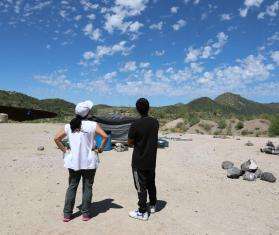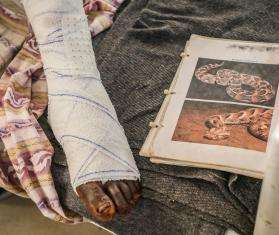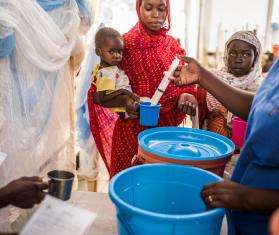To mark World Refugee Day, we are highlighting the voices of people who have been uprooted and forced from their home countries, including our staff at Doctors Without Borders/Médecins Sans Frontières (MSF). Weednyer Jaeson is a cultural mediator with MSF in Mexico, where he helps other Haitians access medical and mental health services. Now a Mexican citizen, Weednyer arrived in Mexico as an asylum seeker in his childhood, when he and his mother fled Haiti. He shared with us his experience of living in a foreign country, and his call for empathy for those who become displaced.
The story below is a transcription from audio, with edits for clarity.
“The reason why I left was because back then my mother had a political problem in Haiti. I was a minor, so I came with her. She went through a process and obtained her residency. I grew up here and then I applied for naturalization, and here I am, a Mexican. Thank God it happened when I was a child because I was able to adapt to change quickly. And that is what has helped me a lot.
My mother used to participate in cultural events to represent Haiti in Mexico. She always came here, and she liked it. She used to talk to me about Mexico, and we always said that someday we would come and visit. That is how I got motivation to get good grades, to come and visit. But unfortunately, she had that problem in her work. You know that politics there are complicated. So when it happened, she came here with me, and we stayed.

It was a process, and she was already doing her documents and I did not know at the beginning. Then one week, she told me, ‘Look, you know what is happening—we are moving to Mexico.’ As a child I was excited, but at the same time I did not know if it was something permanent or temporary.
Communication with my mom was good and she always told me things as they were, and that helped me understand our situation. For a child, when you do not have information, you do not know how to react, you don’t know how you should feel.
Memories of home
What I miss the most is the beach. Since Haiti is an island, everywhere you go, you are [no more than] one and a half or two hours from the beach.
Something I carry with me, most of all, is the culture. I brought the culture with me, and even now, I try to have that culture present in my life. I saw my family again, but only in video calls. That is how we have stayed in touch. But you feel that you want to go to your country. I mean, even though I am Mexican, and I am living here in Mexico, I was also born in Haiti and that is my country.
Displacement is never 100 percent pretty because you leave your country, everything you know, even your family. You leave your environment where you and your friends live. That affects you because it is like going to a new world. Challenges will always be present. I am Mexican, but because of how I look, people see me first as a foreigner and then, with my documents, then they see I am Mexican.
I am working with Doctors Without Borders in a project called Centro de Atencion Integral (CAI). My role is cultural mediator. So [I work on] everything that has to do with communicating with non-Spanish speakers, follow-ups, strategy, and conducting workshops with people who have suffered extreme violence, torture, and inhumane treatment.
Displacement could happen to anyone
The message I send is for people to have more empathy. Displacement is not particular to any person or any country. It could happen to anyone. At any moment, you could have a problem in your country. You don’t know if there will be a war or conflict. And if it happens, from one day to the next, you must move.
We are all vulnerable. So there should be more empathy to understand that the reason why people are leaving is not because they want to. It is not a trip. It is an obligation they have. It is a necessity.
What I want for the future is to help as many people as possible and to keep learning because life is a school, so you must learn as much as you can.
People on the move, explained
Refugees, asylum seekers, migrants, and internally displaced people: We might have heard these words before, but what do they mean? And what circumstances could push someone to leave their home?




